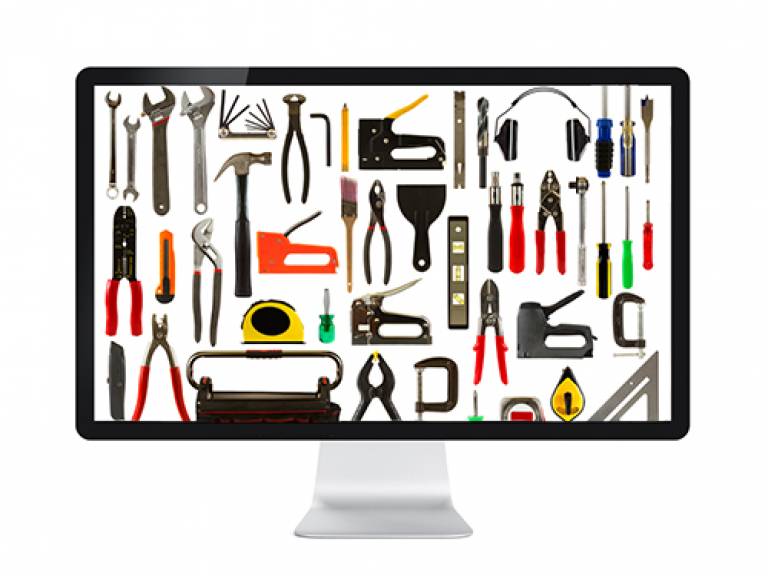5 useful (but underused) online teaching tools
23 June 2014

A quick roundup of five lesser-known web tools available to all staff at UCL
1 MyPortfolio
What is it?
Try and define this e-portfolio tool through its similarities to popular external sites, and you soon realise it’s actually a number of tools rolled into one. It has the blogging capability of Wordpress or Tumblr (though in MyPortfolio they are called ‘Journals’); CV resources similar to LinkedIn; and networking elements familiar to Facebook users. The key advantage over all these tools, though, is that it’s an institutional resource with the added security and privacy controls that that offers.
Why use it?
It can be used in teaching in many ways. Students can create individual portfolios, perhaps to apply for work placements. They could also be asked to create and present content in the form of portfolios as part of an assessed piece of work. And it can be used for group work, with individual pages copied to a group resource. The History department have already shown what can be achieved on their Making History first-year undergraduate module.
How can I access it?
Visit MyPortfolio and login with your standard UCL user credentials. On the homepage you will also find a user guide and resources.
2 Box of Broadcasts
What is it?
BoB (Box of Broadcasts) National is the latest addition to the list of tools available to UCL staff. It is an online TV and radio recording service that enables all staff and students to choose and record any broadcast programme from 60+ TV and radio channels. The recorded programmes are then kept indefinitely and added to a media archive that currently holds more than one million programmes.
You can also schedule recordings in advance, edit programmes into clips and create playlists.
Why use it?
There are lots of options for recording and accessing TV content, from hard drive recorders and Youtube, to broadcasters’ various on demand services. BoB has the advantage of bringing content from dozens of channels over a long period of time into one place.
How can I access it?
Visit the BoB site, login with your UCL user credentials and start watching.
3 UCL Wiki
What is it?
Like Wikipedia, UCL’s very own wiki offers users an online space where they can share information and update and edit each other’s contributions.
All staff and students have access to the system. Just log in with your standard UCL credentials, and a personal space will automatically be created. You can then post text, add video and images and embed social media feeds.
Why is it useful?
It gives students the ability to collaborate without having to use external tools and doesn’t require the tutor to set anything up – it’s already there waiting to be used. And it’s incredibly simple.
How can I access it?
Visit wiki.ucl.ac.uk to open your Wiki page. You may also like to read this Archaeology case study that features Professor Marcos Martinon Torres’s use of the UCL Wiki and visit the pages he created to offer video production guidance to students.
4 Moodle completion tracking
What is it?
A handy facility that allows UCL staff to monitor the progress of students in Moodle. And all you need to do is tick one check box in the Moodle course settings to start using it. It can then be used to generate reports for teaching staff, detailing who has completed each activity and gives an option to message (and email) any students who have not contributed.
Why is it useful?
Students can use it to help them track where they are up to, and staff can use it to see how students are progressing and identify any who may be falling behind.
How can I access it?
Go to your Moodle course settings and look for ‘student progress’. You’ll find a check box labeled ‘completion tracking’. Tick it. To access reports you should then go to the navigation panel on the resource or activity settings page and look for ‘activity completion’. For extra guidance visit this step-by-step Moodle support page hosted on UCL Wiki.
5 Digital reading lists
What is it?
A web-based reading list system run by Library Services. While in the past tutors may have been tempted to download journal articles as PDFs and post them to Moodle for students, now there is a quick and easy-to-use system that doesn’t risk contravening copyright laws.
Simply collect together your list of resources, add them to one of your own reading lists and then include the Library Resources block with the link to the Reading List enabled. Students will be able to access the electronic texts, while hard copy texts will link them through to the library reservation system. You can also use the system to search other module lists on relevant topics and can add in links to websites and other resources, as well as books and journal articles.
Why use it?
You won’t risk infringing copyright laws and students will have access to a single easy-to-use list of resources.
How can I access it?
Go to the UCL Reading Lists site. You can also find a quick guide and FAQs at this UCL Library Services page.
 Close
Close

